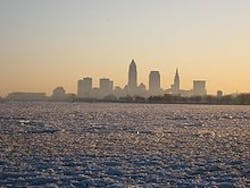DOJ, EPA reach agreement to prevent sewage discharge to Lake Erie
CHICAGO, JULY 20, 2017 -- The U.S. Department of Justice and U.S. Environmental Protection Agency proposed a partial settlement with the city of Cleveland Heights, Ohio, to resolve alleged Clean Water Act violations involving sewer overflows into Doan Brook and Dugway Brook, which flow to Lake Erie. The State of Ohio joins in the settlement lodged in U.S. District Court for the Northern District of Ohio.
"Keeping raw sewage out of U.S. waters and communities is a priority for EPA because overflows can present a significant threat to human health and the environment," said EPA Region 5 Water Division Director Chris Korleski. "Today's settlement will protect water quality and prevent the spread of disease-causing bacteria and viruses."
The settlement requires Cleveland Heights to take immediate steps to upgrade its sewer system. The city has already begun to address locations where overflows are frequent. Other required steps include cleaning, inspections, enhanced monitoring and computer modeling as part of a comprehensive study to assess the sewer system's overall capacity. The city estimates this work will cost about $12 million. By June 2021, the city must submit a master plan to eliminate sewer overflows to EPA for approval. At that time, EPA and Cleveland Heights expect to reach a second settlement to implement the master plan.
The United States filed a simultaneous complaint in federal court against the city and the State of Ohio. A Clean Water Act provision requires naming the state as a plaintiff or a defendant in such actions. The proposed consent decree is available for public review and comment for 30 days. It can be viewed online at https://www.justice.gov/enrd/consent-decree/us-v-city-cleveland-heights-ohio-and-state-ohio.
